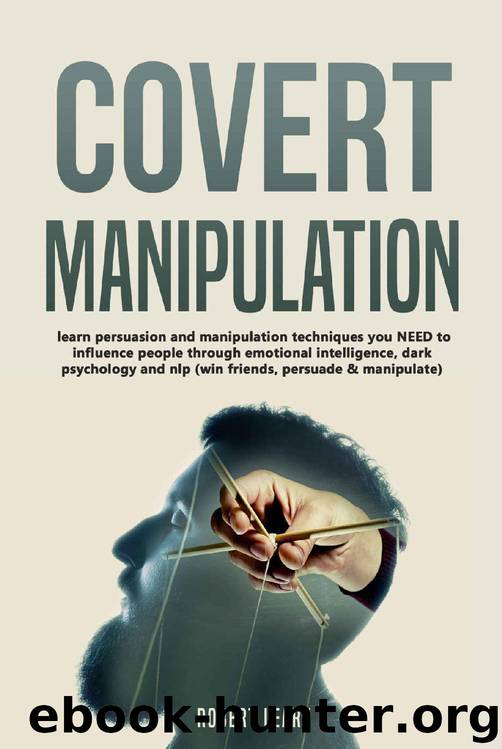Covert Manipulation: Learn Persuasion and Manipulation Techniques You NEED to Influence People Through Emotional Intelligence, Dark Psychology and NLP (Win Friends, Persuade and Manipulate) by Robert Leary

Author:Robert Leary [Leary, Robert]
Language: eng
Format: epub
Published: 2019-04-19T07:00:00+00:00
Chapter Four: The Power of Persuasion
Persuasion has a long and deep history within our society. Persuasion has been long studied and has many connecting theories into its function and the best ways to persuade others. In the history of persuasion, it begins with the Greeks. The Greeks believed very strongly in rhetoric and elocution as the highest belief system for a successful individual. Most well-known for his theories of persuasion, Aristotle listed the main reasons why one should concern themselves with the art of persuasion. The first is that the truth and justice are believed to be perfect, so that if a case is lost it is the fault of the speaker. The second reason is that it is an excellent tool for teaching others. The third is that a good persuasive speaker needs to understand how to argue both sides of a case and understand all parts of the problem. The fourth and final reason that Aristotle list for why you won’t learn the art of persuasion is that there is no better way to defend oneself than through the art of persuasion. Aristotle is most famous, and most widely taught in our schools today for his three rhetorical proofs. These are of course the well-known ethos, logos, and pathos. Ethos is defined as the credibility of the person speaking and is something you must convince your audience of in order to gain their trust. Logos is defined as reason and is often described as showing proof of your argument. Pathos is often described as the appeal to an audience's emotions. This is arguably the most powerful rhetorical proof because it plays emotions of the audience listening. In addition to these rhetorical proofs indicated by the Greek philosopher Aristotle there are many more psychological theories for the art of persuasion.
Download
This site does not store any files on its server. We only index and link to content provided by other sites. Please contact the content providers to delete copyright contents if any and email us, we'll remove relevant links or contents immediately.
The Art of Thinking Clearly by Rolf Dobelli(9815)
Mindhunter: Inside the FBI's Elite Serial Crime Unit by John E. Douglas & Mark Olshaker(8654)
Change Your Questions, Change Your Life by Marilee Adams(7324)
Nudge - Improving Decisions about Health, Wealth, and Happiness by Thaler Sunstein(7199)
Mastermind: How to Think Like Sherlock Holmes by Maria Konnikova(6898)
The Power of Now: A Guide to Spiritual Enlightenment by Eckhart Tolle(5295)
Men In Love by Nancy Friday(4936)
Altered Sensations by David Pantalony(4834)
Factfulness: Ten Reasons We're Wrong About the World – and Why Things Are Better Than You Think by Hans Rosling(4457)
The Confidence Code by Katty Kay(3996)
Thinking in Bets by Annie Duke(3973)
Man and His Symbols by Carl Gustav Jung(3807)
The Worm at the Core by Sheldon Solomon(3295)
Why Buddhism is True by Robert Wright(3262)
Three Women by Lisa Taddeo(3256)
Liar's Poker by Michael Lewis(3193)
Descartes' Error by Antonio Damasio(3141)
The Inner Life of Animals by Peter Wohlleben(3075)
The Power of Mindful Learning by Ellen J. Langer(3058)
